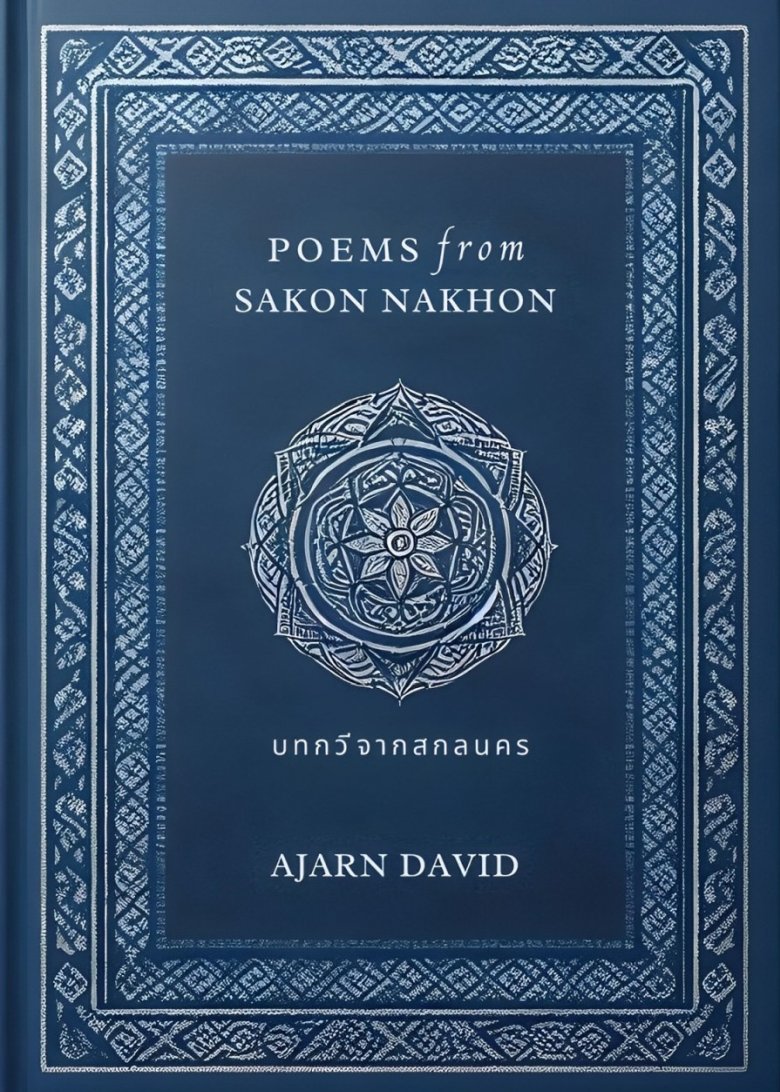"The themes of Poems from Sakon Nakhon — nature, rural life, love, and spirituality — are deeply rooted in Thai culture, providing an immediate sense of familiarity to English students in Thailand. "
Using Thai Poems to Learn English
F
or Thai students learning English, "Poems from Sakon Nakhon" by Ajarn David is a valuable and engaging resource. This bilingual poetry collection, written in both English and Thai, provides a bridge for learners to explore English through the lens of familiar cultural themes.
Its structure — ninety-one English poems alongside Thai translations and transliterations — offers a creative and accessible approach to building language skills while appreciating the art of poetry.
Bilingual Format: A Learning Advantage
T
he bilingual layout is one of the book's most important features for English language learners in Thailand. Each English poem is paired with its Thai translation, allowing readers to cross-reference the two languages.
This structure helps learners connect English vocabulary and sentence structure to their Thai equivalents, making the learning process intuitive and relatable.
For example, in the poem about Buddhism's First Noble Truth, learners read:
So take up your suffering,
like the stem of a flower,
and let the petals unfold.
By comparing this with the Thai version:
จงรับทุกข์ดั่งก้านดอก ให้กลีบผลิบานรอ,
students can identify key words like "suffering" (ทุกข์), "flower" (ดอก), and "unfold" (ผลิบาน), building both vocabulary and understanding.
Students also can identify and analyze the differences between the English and Thai versions, and discuss the reasons for these differences.
Using Poems to Improve English Skills
H
ere are practical ways Thai students can use Poems from Sakon Nakhon to enhance their English:
Read Aloud for Pronunciation
Start by reading the English poems aloud. Focus on rhythm, pronunciation, and intonation. Poetry often employs natural cadences, which will help Thai learners improve the flow of their spoken English.
Expand Vocabulary
Highlight unfamiliar words in the English text, then look to see if they were included in the Thai translation (or if not, check the dictionary). For instance, a word like "suffering" in a poem about Buddhism can be internalized through its Thai equivalent (ทุกข์).
Identify Sentence Structure
Use the English poems to identify sentence patterns and grammar rules. Compare them to the Thai translations to understand how English grammar differs from Thai.
Engage in Creative Writing
After reading a Thai poem in the book, try writing your own version in English. Use the poem’s structure as a guide, substituting words to describe your own experiences or emotions which relate to the poem's theme or topic.
For example, one of the poems deals with the topic of falling in love, referred to in Thai as dtòk lŭm rák (ตกหลุมรัก). Think about how the poem addresses this topic and write a new version from your own perspective.
Focus on Cultural Context
By reading about familiar Thai concepts, such as having a "water heart" (น้ำใจ) or Buddhist teachings, learners can better grasp abstract English terms like "consideration" or "impermanence." This cultural connection makes it easier to remember and use these terms.
Building Confidence in Reading
Ajarn David’s poems are written in accessible, free-verse English, making them an excellent starting point for learners intimidated by dense or overly complex texts. The language is clear and straightforward, yet poetic enough to challenge intermediate students to think critically.
For beginners, the accompanying Thai translations provide reassurance, ensuring they don’t feel lost as they work through the English text.
Learning Through Relatable Themes
T he themes of Poems from Sakon Nakhon — nature, rural life, love, and spirituality—are deeply rooted in Thai culture, providing an immediate sense of familiarity.
For example, in a poem about the rainy season, we read:
The rainy season
is a season of change,
with lush rice fields
carpeting the earth...
This passage mirrors experiences familiar to Thai readers, helping them form mental connections between English phrases and their real-life meanings. By anchoring abstract English words in concrete Thai realities, learners can retain vocabulary more effectively.
Encouraging a Love of English
P
oems from Sakon Nakhon does more than teach English — it inspires learners to enjoy the language.
The poetic format encourages readers to think of English not just as a practical skill but as a way to express emotions, share ideas, and appreciate beauty. The playful tone of some poems, like one about a food vendor, makes the learning process enjoyable:
The noodle seller
who works after dark
is an angel in disguise...
This lighthearted imagery makes English feel less daunting and more relatable.
Developing Cultural Fluency
B
y exploring Thai culture through English, readers gain a deeper understanding of how ideas are expressed in a global context.
For instance, in the Thai poem about being "greng-jai" we read:
It is to know
that our place in the world
is not to seek favors
from others...
Thai students not only learn new vocabulary and sentence structures but also see how uniquely Thai concepts are conveyed in English, enriching their ability to communicate across cultures.
For Thai English Students of All Levels
W
hether you’re a beginner, intermediate, or advanced English learner in Thailand, this book offers something for everyone:
Beginners can start by focusing on simple vocabulary and pronunciation using the transliterations.
Intermediate learners can analyze the English text for grammar patterns and idiomatic expressions.
Advanced learners can explore the subtleties of poetic language and experiment with writing their own poetry in English.
A Gateway to English and Beyond
P
oems from Sakon Nakhon is more than a language-learning tool—it’s a window into the beauty of cross-cultural understanding. By using familiar themes to teach English, Ajarn David offers Thai students a way to engage with the language in a meaningful, enjoyable, and effective manner.
English teachers in Thailand who are interested in acquiring inexpensive copies of a student version of "Poems from Sakon Nakhon," along with an easy to follow teacher's manual, please contact us via our Contact Page.






